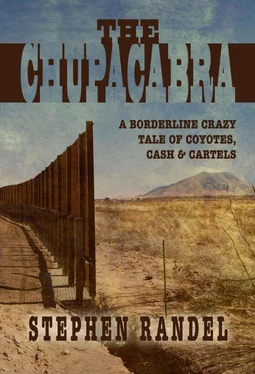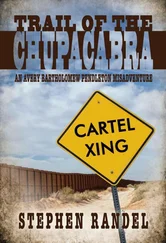The General returned to the top of the ridge with Fire Team Leader Charlie and Private Zulu and gathered up the remainder of his troops. He congratulated his exhausted men on Operation Land Shark’s glorious and overwhelming first victory against the scourge of illegal immigration. Sensing the sun was coming up soon, the General suspended the evening’s surveillance activities and ordered the men back to the base camp. The dusty and tired men literally fell into their sleeping bags, and within seconds the snores of the soldiers of STRAC-BOM filled the early morning desert sky.
CHAPTER SIX
I Walk the Line
In the morning, El Barquero woke early to the sound of the roosters announcing the arrival of the dawn. He quickly showered and dressed before heading downstairs. In the kitchen, the Padre sat drinking coffee and reading a newspaper while one of the female house servants prepared frijoles, tortillas, and fried eggs. A disposable prepaid cell phone rested on the table in front of him.
“Come, sit down, my friend,” the Padre said as he noticed the large man in the doorway. The woman at the stove poured a cup of coffee for El Barquero and placed it in front of him. “Did you rest well?” the Padre asked.
“Yes, Padre,” he said as he drank from the delicate china cup. “Thank you for having me as your guest.”
“After your good work these last few months, it’s the least I could do. Well, besides pay you!” The Padre laughed loudly.
The woman brought plates and silverware to the table, quickly followed by a large platter of food.
“Anything else, Padre?” she asked humbly.
“Not now,” he replied. “You may leave us.” The two men spent the next few minutes eating their breakfast in silence as the Padre continued to thumb through his newspaper. “Ah, you see this?” the Padre said, breaking the silence as he pointed to an article on the new police chief in Nuevo Laredo. “That is why I’m heading to Nuevo Laredo this morning.”
“I didn’t think they had a police chief.”
“They haven’t, at least not for the last year. Someone kept killing them,” the Padre said with a smile. “This one is different. He works for me. He’ll be crossing the border on a regular basis to work with a Texas law enforcement task force concentrating on stopping illegal drug traffickers. Ironically, each time he travels to Laredo, the tires of his police car will be filled with exactly what he is charged with interdicting. You finished with breakfast?”
“Yes, Padre.”
“Good,” he snatched up his phone and headed to the door. “Come with me. I want to show you something. You know, I don’t even know why they try stopping us anymore,” the Padre said as they crossed the compound to the barn. The armed guards remained, but the mass of cars from the previous night had mostly disappeared. “The Mexican authorities are in chaos. On top of that, they’re broke. That’s why so many soldiers run away from the army and the police and join the cartels. Who wants to fight if you aren’t sure if you’re going to get paid? And the Americans, what do they do? Every few years they promise the Mexican government a billion dollars here or a billion dollars there to help. A billion dollars a year!” He made a grand gesture in the air with his hands. “Sure, it makes for a great headline on the evening news. But compared to what? The ten or twenty billion dollars a month they spend on their wars on the other side of the planet. No, we’re the ones with the resources, my friend.” The Padre opened the barn door. “As long as Americans demand our product, no one can stop more than a small percentage of our shipments.”
Swinging open the barn door, El Barquero was amazed to see that the cockfighting pit and bleachers had been removed, leaving only an open dirt floor. The bodies of two naked men with hands tied behind their backs hung from ropes around their necks from the rafters above. Examining the men, El Barquero noticed they had been tortured before they died. He immediately recognized one of the men from last night. He was the one with the gun who had stopped him from entering the barn.
“Don’t mind them,” the Padre said as he quickly paced across the barn floor toward a metal door on the opposite side of the room. “Just thieves that stole from me. My partners and I don’t care for thieves.”
The Padre entered a code on the keypad mounted next to the door and motioned for El Barquero to enter. The room was long and rectangular, with metal floors and walls. It was filled with workers who were moving loads of heroin, cocaine, and methamphetamines and packaging them for delivery. El Barquero had been to the farm before, but never had he been allowed to enter this room. The Padre greeted the laborers by name, asking some about their families as they walked down the main aisle of the long room.
“One big happy family,” he explained as they reached another locked door at the end of the room. Entering another code, he invited El Barquero into the small, windowless office. “Have a seat,” the Padre said as he dropped into the plush black leather chair located behind an ornate mahogany desk. He reached into his inner suit coat pocket and produced another thin cigar. “Not a good idea to smoke on the floor,” he said as he lit the cigar, “but fine in here. You don’t smoke, do you?”
“No, Padre.”
“What do you think?” the Padre asked as he placed the cigar on the edge of a large crystal Waterford ashtray resting on the desk. “I’ve never shown you this before.”
“Very impressive.”
“Our cartel has dozens of these spread around our territories. Of course, we also have others for storing weapons, and machine shops for assembly, repair, and conversion of the semiautomatics to fully automatic, even motor pools for our vehicles. Hell, we even have our own medical facilities.”
“The business has become quite complicated,” El Barquero noted.
“Without a doubt. Not like in the old days when the Colombians paid us by the load to smuggle their cocaine across the border. Back then, we were just mules in the transportation business. Eventually, we got smart. We asked to be paid in product so we could start our own businesses and not just serve as Mexican middlemen. Then the big thing happened. The Americans decided to make a statement. President Clinton declared war on the Colombian dealers. For years, they focused only on South America. It gave us a window of opportunity to vertically integrate our businesses. Now we control the raw materials and supplies, labor, manufacturing, distribution, and even the marketing. Did you see the men stamping the pills and blocks of product with our insignia? Educated consumers want to know the origin of their product these days.
“Yes, the business has become complicated,” said the Padre as he puffed on his cigar. “I even have public relations work to do. At least, that’s what I consider my business with our new police friend in Nuevo Laredo today. Just making sure we have the right friends in the right places. Ultimately, expansion and integration is what led the cartels to form. Sometimes it’s easier to grow through mergers and acquisitions of many small businesses than organically. Sometimes these mergers were friendly, and sometimes they were not. But the more the business grew, the more the different cartels squabbled and fought. Now the most important asset is access to the border. We were fortunate to have an original location on the Gulf Coast border; it gave us early access to America. Now the challenge is expanding that territory. It will be bloody. The other cartels have guns, too. That’s the only thing I worry about, not the army or the police or the Americans—the other cartels. That’s why the idea of thieves stealing shipments near Juarez is so troubling. When we do go to war, I want it on my terms, not theirs.” The Padre finished his cigar and stubbed it out in the ashtray. Reaching under his desk, he pulled out a metal suitcase and placed it on the desk. “Half the money now,” he said as he slid the silver case across the desk to El Barquero. “Half when the ship lands and the weapons are delivered to Matamoros.”
Читать дальше












